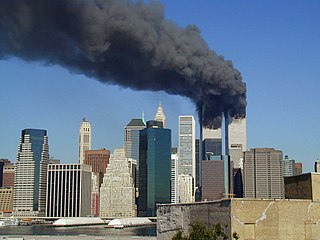
United Nations Security Council Resolution 1373, adopted unanimously on 28 September 2001, is a counterterrorism measure passed following the 11 September terrorist attacks on the United States. The resolution was adopted under Chapter VII of the United Nations Charter, and is therefore binding on all UN member states.

United Nations Security Council resolution 1566, adopted unanimously on 8 October 2004, after reaffirming resolutions 1267 (1999), 1373 (2001) and 1540 (2004), the Council condemned terrorism as a serious threat to peace and strengthened anti-terrorism legislation.
The ISIL (Da'esh) and Al-Qaida Sanctions Committee is a committee of the United Nations Security Council tasked with implementing international sanctions against the Islamic State and al-Qaeda. It was established as the Al-Qaida and Taliban Sanctions Committee on 15 October 1999, pursuant to Security Council Resolution 1267, which designated al-Qaeda and the Taliban as terrorist organizations. Following the creation of a separate Taliban Sanctions Committee on 17 June 2011, it was renamed the Al-Qaida Sanctions Committee. The scope of the sanctions regime was expanded to include the Islamic State on 17 December 2015 pursuant to Resolution 2253.
The Counter-Terrorism Committee is a subsidiary body of the United Nations Security Council.
United Nations Security Council Resolution 1904, adopted unanimously on 17 December 2009, after reiterating its "unequivocal condemnation" of Osama bin Laden, the Taliban and Al-Qaeda for "ongoing and multiple criminal terrorist acts", the Council adopted new measures to its decade-old regime of sanctions on the groups and others associated with them. The decision to adopt new measures originated from questions arising since Resolution 1267 (1999) and subsequent resolutions which imposed travel restrictions, asset freezes and an arms embargo on Osama bin Laden, the Taliban, Al-Qaeda and other associated groups which were placed on a "Consolidated List" compiled by the Security Council Committee established by Resolution 1267.

United Nations Security Council resolution 1054, adopted on 26 April 1996, after reaffirming Resolution 1044 (1996) concerning the assassination attempt on Egyptian President Hosni Mubarak at an Organisation of African Unity (OAU) summit in the Ethiopian capital Addis Ababa on 26 June 1995, the Council placed sanctions on the Government of Sudan after its failure to comply with OAU requests to extradite suspects sheltered in the country to Ethiopia.

United Nations Security Council resolution 1452, adopted unanimously on 20 December 2002, after recalling resolutions 1267 (1999), 1333 (2000), 1363 (2001), 1368 (2001) and 1390 (2001) concerning Al-Qaeda, the Taliban and terrorism, the Council decided that financial sanctions against the organisations would not apply to expenses for food, rent, medicine and medical care, health insurance and professional fees.

United Nations Security Council resolution 1455, adopted unanimously on 17 January 2003, after recalling resolutions 1267 (1999), 1333 (2000), 1363 (2001), 1373 (2001), 1390 (2001) and 1452 (2002) concerning Al-Qaeda, the Taliban and terrorism, the council improved the implementation of measures against the groups. It was the first Security Council resolution adopted in 2003.
United Nations Security Council resolution 1456, adopted unanimously on 20 January 2003 in a meeting at the foreign minister level, the council adopted a declaration calling on all states to prevent and suppress all support for terrorism. The resolution did not define terrorism, but unlike other previous resolutions, mentioned human rights for the first time.
United Nations Security Council resolution 1526, adopted unanimously on 30 January 2004, after recalling resolutions 1267 (1999), 1333 (2000), 1363 (2001), 1373 (2001), 1390 (2001), 1452 (2002) and 1455 (2003) concerning terrorism, the council tightened sanctions against Al-Qaeda, the Taliban, Osama bin Laden and associated individuals and groups.

United Nations Security Council Resolution 1963, adopted unanimously on December 20, 2010, after reaffirming resolutions 1373 (2001), 1535 (2004), 1624 (2004), 1787 (2007) and 1805 (2008), the Council decided to continue the Counter-Terrorism Committee Executive Directorate (CTED) under the guidance of the Counter-Terrorism Committee (CTC) for another three years until December 31, 2013.

United Nations Security Council resolution 1617, adopted unanimously on 29 July 2005, after recalling resolutions 1267 (1999), 1333 (2000), 1363 (2001), 1373 (2001), 1390 (2001), 1452 (2002), 1455 (2003), 1526 (2004) and 1566 (2004) concerning terrorism, the Council renewed sanctions against Al-Qaeda, the Taliban, Osama bin Laden and associated individuals and groups for a further seventeen months.

United Nations Security Council Resolution 1735, adopted unanimously on December 22, 2006, after recalling resolutions 1267 (1999), 1333 (2000), 1363 (2001), 1373 (2001), 1390 (2001), 1452 (2002), 1455 (2003), 1526 (2004), 1566 (2004), 1617 (2005), 1624 (2005) and 1699 (2005) on terrorism, the Council approved measures to improve the identification and control of terrorists.

United Nations Security Council Resolution 2017 was unanimously adopted on 31 October 2011.

United Nations Security Council Resolution 2199 was unanimously approved on 12 February 2015 to combat terrorism. Drafted by Russia, its legally binding provisions gave the fifteen nations of the United Nations Security Council authority to enforce decisions with economic sanctions. The resolution, in particular, emphasized "the need to combat by all means, in accordance with the Charter of the United Nations and international law, [...] threats to international peace and security caused by terrorist acts".

United Nations Security Council Resolution 2249 was unanimously adopted on 20 November 2015. It notably calls upon all Member States to redouble their efforts against both ISIL and the al-Nusra Front as well as other al-Qaeda affiliates as designated by the Security Council.

International sanctions against Afghanistan were implemented by the United Nations in November 1999. The sanctions were initially aimed at terrorists, Osama bin Laden and members of Al-Qaeda. The United States, the United Kingdom and the European Union also impose sanctions on Afghanistan.

United Nations Security Council Resolution 2560 was adopted on December 29, 2020. It was the last Security Council resolution of the year.












